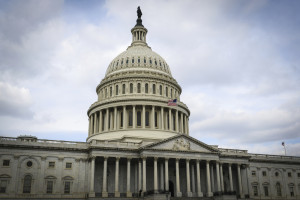
Senate votes against banning mandatory arbitration in financial contracts, House passes a bill to curb “sue and settle” practices, and more…
IN THE NEWS
- Using the Congressional Review Act, the U.S. Senate voted 51-50, with Vice President Mike Pence casting the tie-breaking vote, to repeal a Consumer Financial Protection Bureau (CFPB) rule that banned mandatory arbitration clauses in financial contracts. Richard Cordray, the director of the CFPB, reportedly said this vote “is a giant setback for every consumer in this country.” The White House said that, by repealing the rule, “Congress is standing up for everyday consumers and community banks and credit unions.”
- The U.S. House of Representatives passed a bill that would curb sue and settle practices by requiring agencies to undergo notice and comment review before settling lawsuits brought by pro-regulatory groups. U.S. Representative Doug Collins (R-Ga.), who introduced the bill, said the bill was an attempt “to draw back the curtain on federal agencies that have colluded with special interest groups at the expense of American workers and families.” U.S. Representative Jerrold Nadler (D-N.Y.) said the bill would “disrupt and delay rules that protect public health and safety.”
- The entire U.S. Court of Appeals for the D.C. Circuit reversed an order by three judges of that court that prevented an undocumented, unaccompanied teenager from getting an abortion unless she found a custodian by October 31. The reversal reportedly allowed the girl to get an abortion. The D.C. Circuit considered the earlier decision, which was issued last week, “a grave constitutional wrong” because it placed “unjustified obstacles” in the girl’s path to obtaining an abortion, which the U.S. Supreme Court has prohibited.
- President Donald Trump issued an Executive Order to allow refugees to enter the United States again. Pursuant to an Executive Order from March, the U.S. Refugee Admissions Program had been under “review” for a 120-day period that ended on October 24; during that time, all refugees were barred from entering the United States. The latest Executive Order acknowledges that the measures taken in the earlier order are “not needed at this time to protect the security and interests of the United States.”
- The U.S. Department of Education delayed the effective date of an Obama-era final rule, which expanded the Education Department’s authority to forgive student loans, especially loans for students enrolled in “predatory” schools that mislead prospective students and do not “provide a high-quality education.” The rule was originally scheduled to go into effect on July 1, 2017; however, the delay pushed the implementation to July 1, 2018.
- The Federal Communications Commission (FCC) voted to repeal the Main Studio Rule that required radio and TV broadcasters to “maintain a main studio located in or near its community of license.” The FCC recognized that this rule was “outdated and unnecessarily burdensome” and noted that repealing the rule “should produce substantial cost-saving benefits for broadcasters.”
- President Trump designated David Kautter, Assistant Secretary for Tax Policy in the U.S. Department of the Treasury, to be Acting Commissioner of the Internal Revenue Service (IRS). Treasury Secretary Steven T. Mnuchin said he is “confident that the IRS and the American people will benefit from [Kautter’s] experience and insight.”
- President Trump issued a memorandum creating a drone integration pilot program in which the U.S. Department of Transportation will work with state and local governments to “integrate drones into local airspace.” The pilot program will allow testing of drone operations that are currently restricted, such as flights over people.
- AT&T and Time Warner extended the deadline for their merger as they await approval from the U.S. Department of Justice. Regulators in Europe, South America, and Mexico have already approved the $85 billion merger.
- Twitter said that it would start labeling election ads “to dramatically increase transparency.” The action reportedly comes during inquiries into illegal social media use to manipulate the 2016 Presidential Election. U.S. Senator Amy Klobuchar (D-Minn.), who is cosponsoring a bill to “improve the transparency of online political advertisements,” criticized Twitter’s action, saying it “is no substitute for improving our laws.”
WHAT WE’RE READING THIS WEEK
- In an article for the Carbon & Climate Law Review, Robert Glicksman of George Washington University Law School considered environmental regulation under the Trump Administration. Glicksman concluded that even with the repeal of the Clean Power Plan, market forces and industry wariness of potential future regulation will “drive electric generating capacity away from coal as a fuel source.”
- In an article for the Duke Law Journal, Olatunde Johnson, Jerome B. Sherman Professor of Law and Vice Dean at Columbia Law School, discussed the use of “inclusive regulation” —regulation that is “more open ended, less coercive, and more reliant on rewards, collaboration, flexibility, and interactive assessment”—by civil rights agencies. Johnson suggested a “framework” for increasing the success of this new type of regulation.
- In an article for the ModernMedicine Network, Adam E. Block, a professor at New York Medical College, doubted the effectiveness of President Trump’s recent Executive Order, which intends to assist the buying of health care “across State lines” by “promoting competition.” Block noted that “four tenuous contingencies” must happen for the order to effectuate substantive change. The four contingencies include the creation of regulations implementing the Executive Order that are accepted across agencies; state support of those regulations; successful entry into the market by insurance companies; and patients’ desire to change their plans.



